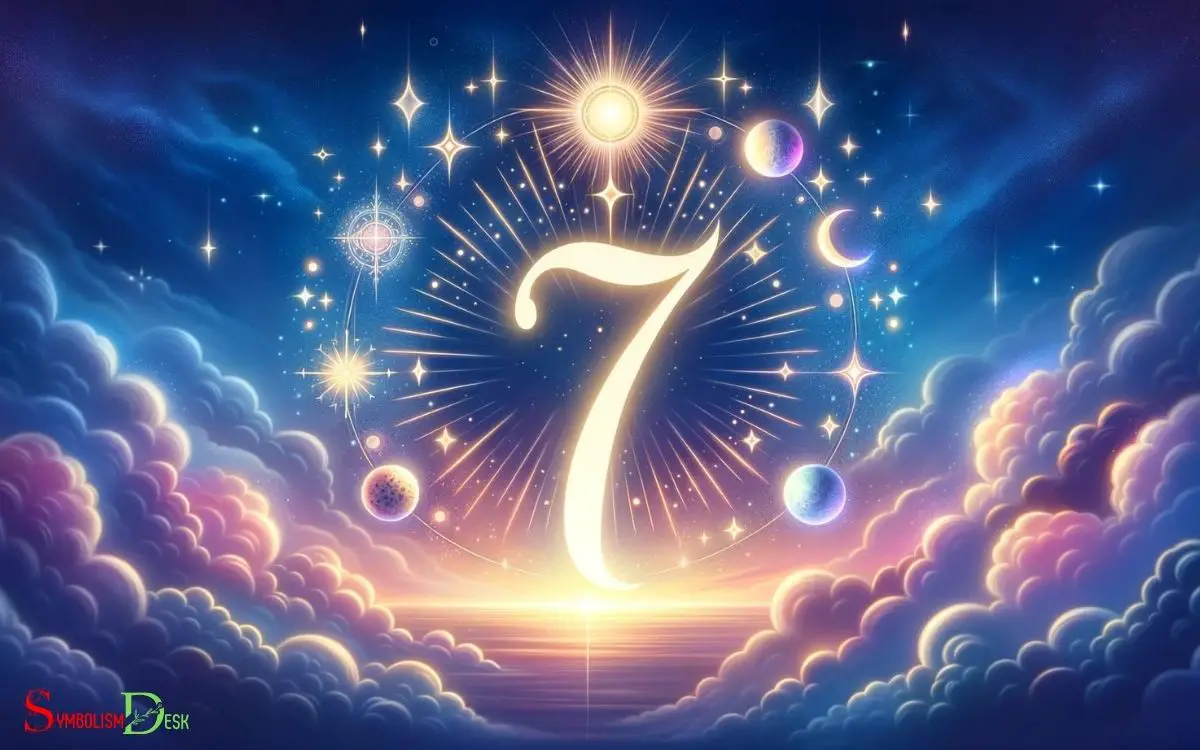What Is the Symbolic Meaning of the Number 7? Perfection!
The symbolic meaning of the number 7 encompasses a myriad of interpretations across various cultures and disciplines, often representing perfection, spirituality, and enlightenment. It is frequently associated with divine connection and completeness.
The number 7 is revered across multiple traditions and beliefs for its deep symbolic significance:
- Religious Significance: In Christianity, 7 represents divine perfection and the creation of the world in 7 days. Judaism holds 7 sacred due to the menorah (seven-branched candelabrum), and the Shabbat is the seventh day of the week. Islam reveres 7 in the structure of the Quran and pilgrimages.
- Cultural Symbolism: Many cultures consider 7 lucky, and it appears in numerous folk tales and myths.
- Mystical Associations: In numerology, 7 symbolizes the seeker, the thinker, and the search for truth. It is seen as a bridge between the material and spiritual worlds.
- Natural World: There are 7 continents, 7 colors in the rainbow, and 7 notes in the musical scale, highlighting its presence in the natural order.
The number 7 is a beacon of cosmic significance, illuminating the path to deeper wisdom and universal harmony.

Key Takeaway
Religious Significance
In religious contexts, the number 7 is often associated with divine perfection and completion. This symbolic meaning can be traced back to various religious texts and traditions.
For instance, in Christianity, the number 7 is seen as representing the completion of God’s creative work, as described in the Genesis account of the Bible.
Additionally, the Book of Revelation portrays a series of sevens, such as the seven seals, seven trumpets, and seven bowls, all signifying the fulfillment of divine prophecy and ultimate perfection.
In Judaism, the seventh day, Shabbat, is a day of rest and completion, reflecting the idea of the number 7 as a symbol of divine perfection.
Across different faiths, the number 7 holds a significant place, representing the ultimate fulfillment and perfection in the divine order.
Cultural Representations
The number 7 holds significant cultural representations across the globe. Its spiritual connotations are evident in various cultures, where it’s often associated with luck, perfection, and divine significance.
Historical and religious interpretations of the number 7 further enhance its symbolic meaning in different cultural contexts.
Global Significance of 7
Across various cultures and belief systems, the number 7 holds significant symbolic importance.
- In Judaism, the number 7 is considered highly sacred, representing completion as seen in the seven days of creation.
- In Christianity, it signifies perfection and is associated with divine power, as seen in the seven sacraments and the seven gifts of the Holy Spirit.
- In Islamic tradition, there are seven heavens, and in Hinduism, the existence of seven higher worlds is recognized.
The significance of 7 is also evident in Chinese culture, where it’s associated with good luck and prosperity.
Furthermore, in many African cultures, the number 7 is linked to the idea of wholeness and is often used in rituals and ceremonies.
The widespread cultural importance of the number 7 reflects its deep-rooted symbolism across the world. This global significance sets the stage for exploring its spiritual connotations in cultures.
Spiritual Connotations in Cultures
Represented in various cultural and religious beliefs, the number 7 holds spiritual significance, reflecting diverse interpretations and symbolic representations.
In different cultures, the number 7 conveys a range of spiritual connotations, each contributing to its mystical allure.
Below is a table outlining the spiritual representations of the number 7 in various cultures:
| Culture | Spiritual Representation |
|---|---|
| Christianity | Completeness, perfection, and the seven gifts of the Holy Spirit |
| Judaism | The seven days of Creation and the significance of Shabbat |
| Islam | The seven heavens and the importance of the seventh day in prayer |
| Hinduism | The seven chakras and the significance of the seven sacred rivers |
| Native American | The seven directions and the sacredness of the number seven |
The diverse spiritual connotations of the number 7 highlight its universal significance across different cultural and religious beliefs.
This spiritual significance of the number 7 has also contributed to its historical and religious interpretations.
Historical and Religious Interpretations
Frequently, cultures and religions have interpreted the number 7 historically and religiously, attributing various symbolic meanings to it.
- In Christianity: The significance of 7 is evident in the seven days of creation, the seven sacraments, and the seven deadly sins, symbolizing completeness and perfection.
- In Judaism: The number 7 holds religious significance, such as the seven days of creation and the seven-branched menorah in the temple, representing divine completion.
These interpretations reflect the deep cultural and religious associations with the number 7, showcasing its pervasive symbolism across different belief systems.
Transitioning into the subsequent section about ‘mystical interpretations’, it becomes evident that the significance of the number 7 extends beyond historical and religious contexts.
Mystical Interpretations
Many cultures and belief systems have assigned mystical significance to the number 7. The spiritual significance of 7 can be found in various religious texts and traditions.
Additionally, numerology and mysticism have also explored the deep symbolism of this number.
Spiritual Significance of 7
The spiritual significance of the number 7 lies in its longstanding association with mysticism and divine symbolism throughout various cultures and belief systems.
Seven in Various Religions: In Christianity, the number 7 is considered sacred, representing completeness and perfection, as seen in the seven days of creation. Hinduism also holds the number 7 in high regard, with seven chakras representing the spiritual energy points in the body.
Seven in Mystical Practices: In numerology, 7 is often associated with introspection, inner wisdom, and spiritual awakening. The seven heavens and seven hells in various mythologies symbolize the journey of the soul through different spiritual realms.
The widespread mystical interpretations of the number 7 demonstrate its enduring significance in spiritual and metaphysical realms.
Numerology and Mysticism
Numerologists and mystics often attribute profound spiritual significance to the number 7, viewing it as a symbol of introspection, inner wisdom, and spiritual awakening.
In numerology, the number 7 is considered a highly spiritual number representing a deep connection to the universe and the unknown.
Mystics believe that the number 7 holds mystical qualities, with many ancient cultures and religious traditions associating it with divine perfection and completion.
Here is a table that shows some mystical interpretations of the number 7 across different cultures and belief systems:
| Culture/Tradition | Interpretation of 7 |
|---|---|
| Christianity | Seven sacraments |
| Hinduism | Seven chakras |
| Islam | Seven heavens |
| Judaism | Seven days of creation |
| Ancient Greece | Seven liberal arts |
Cultural Representations of 7
Cultural traditions and belief systems across the world have attributed profound significance to the number 7, associating it with divine perfection and completion.
This mystical interpretation has led to various fascinating cultural representations of the number 7, including:
Religious Significance: Many major world religions, such as Christianity, Islam, and Judaism, emphasize the importance of the number 7 in their sacred texts and rituals.
For example, in Christianity, 7 is often associated with divine creation and rest, as seen in the seven days of creation and the concept of the Sabbath.
Astrological and Mythological Connections: In astrology and mythology, 7 is linked to celestial bodies and mythical realms, shaping beliefs in cosmic harmony and spiritual enlightenment.
These diverse cultural representations deepen the mystique surrounding the number 7 and its symbolic significance, paving the way for its exploration in numerology and symbolism.
Numerology and Symbolism
Numerology and symbolism play a significant role in interpreting the meaning and significance of the number 7. In numerology, the number 7 is often associated with introspection, inner wisdom, and spiritual awareness.
It’s considered a highly mystical and intuitive number, representing a deep connection to the universe and the pursuit of truth.
Symbolically, 7 is prevalent in various cultures and religions, such as the seven days of the week, the seven wonders of the world, and the seven chakras in Hinduism. In Christianity, the number 7 is symbolic of perfection and completion, as seen in the seven days of creation in the Bible.
Understanding the numerical and symbolic significance of 7 can offer individuals profound insights into different aspects of their lives and the world around them.
Biblical References
The number 7 holds significant biblical references, with its symbolism deeply embedded in the Christian faith and scriptures. In the Bible, 7 is often associated with completeness, perfection, and divine fulfillment.
This symbolism is evident in various ways:
- Creation: The book of Genesis describes the creation of the world in 7 days, highlighting the divine completeness and perfection of God’s work.
- Rest: On the seventh day, God rested from His work, establishing the significance of the Sabbath as a day of rest and completion.
- Revelation: In the book of Revelation, the number 7 appears repeatedly, representing divine perfection and the fulfillment of God’s plan.
- Seven Churches and Seals: The letters to the seven churches and the seven seals symbolize completeness and divine authority.
These biblical references deepen the symbolic meaning of the number 7, emphasizing its spiritual significance and divine nature. These connections underline a recurring theme of divine perfection and completion associated with the number 7 throughout the scriptures. Similarly, the symbolic meaning of 40 in scripture often highlights periods of trial, testing, and transformation, as seen in events like the Israelites’ 40 years in the wilderness or Jesus’ 40 days of fasting. Together, these numbers weave a rich tapestry of spiritual lessons and divine patterns that guide believers in their faith journey.
Historical and Folklore Connections
With roots in ancient civilizations, the symbolic significance of the number 7 is evident in historical and folklore connections. Throughout history, this number has held special significance in various cultures.
In ancient Mesopotamia, the seven celestial bodies were associated with different gods and goddesses, while in ancient Egypt, there were seven Hathors who were considered to be manifestations of the goddess Hathor.
The Greeks had seven wonders of the ancient world, and in Norse mythology, there are references to the existence of seven worlds.
In folklore, the number 7 is often tied to luck and magic. Many fairy tales feature the motif of the ‘seventh son of a seventh son’ possessing special powers.
The prevalence of the number 7 in historical and folklore connections underscores its enduring symbolic importance.
Can the Symbolic Meaning of the Number 7 be Applied in Mathematical Contexts?
The number 7 holds significant symbolic meaning in various cultures, but can it be applied in mathematical contexts? In symbolic form in math, 7 can represent a prime number, a divisor, or a power in equations, showcasing its unique mathematical properties beyond its cultural symbolism.
Modern-Day Relevance
In contemporary culture, the number 7 retains its symbolic significance in various fields, including psychology and popular culture.
Psychology In psychology, the ‘magical’ properties associated with the number 7 have led to its use in cognitive studies. Researchers have found that people tend to remember lists of 7 items more easily than longer or shorter lists, a phenomenon known as the ‘7±2 rule.’
Popular Culture The number 7 continues to hold sway in popular culture, finding its way into numerous aspects of modern life, from the seven wonders of the world to the depiction of seven deadly sins in literature and film.
Its presence in everything from fairy tales to marketing strategies serves as a testament to its enduring influence in today’s society.
Conclusion
The number 7 holds a rich symbolic meaning across various religious, cultural, and mystical contexts. It’s often seen as a number of completion, perfection, and spiritual fulfillment. In Christianity, the number 7 is associated with the seven days of creation and is often seen as a divine number representing the fullness of God’s work. In numerology, it’s considered a spiritual number that signifies a deep connection to the universe. Additionally, in some mystical traditions, the number 7 is seen as a transformation symbol 555, representing the potential for personal growth and evolution. Overall, the number 7 carries a powerful significance that transcends cultural and religious boundaries.
From biblical references to historical and folklore connections, the significance of 7 continues to resonate in modern-day society.
Like a shining star in the night sky, the number 7 guides and inspires people across different cultures and beliefs.






